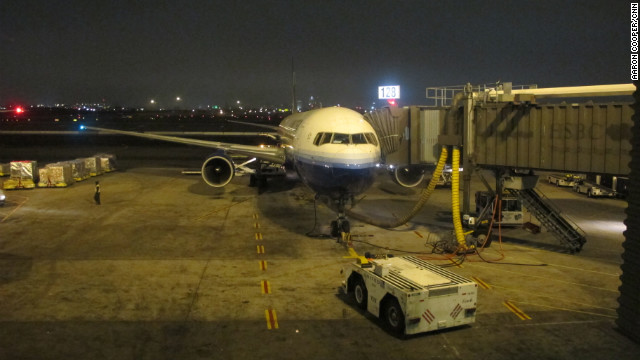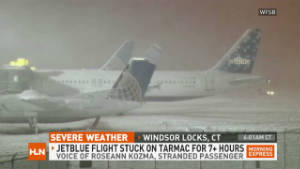
Washington (CNN) -- No one is immune to airline delays and cancellations, even if you're an aviation producer who just spent two days telling the story of how airlines try to keep planes flying on time.
My recent trip to Turkey was plagued with problems: a broken engine part on one aircraft, a broken lock on the cockpit door of another, a whack from the tow bar used to push planes away from the gate on a third, plus a canceled flight and a missed connection. Altogether, these snafus delayed my arrival in Istanbul by 12 hours.
GIven my luck, I wasn't surprised a couple of days later when one of my domestic flights within Turkey was canceled. And on the the way home to the United States, a broken exit sign in the cabin caused a three-hour delay and near cancellation.
As the projected 5.6 million Americans take to the sky this holiday season, it's a safe bet they are all hoping not to hear the dreaded words "cancellation" and "delay." But we all know that there's no avoiding delays sometimes.
CNN put together some travel tips to help you get to your destination and back with the least trouble possible.

Know your options
A key to surviving a delay or cancellation is to consider your options even before you book.
Take note of flights your airline offers that could be backup options in case of disruptions, and perhaps most importantly, make sure there are actually alternative flights.
Flying early in the morning gives you a buffer if your flight gets delayed or canceled. Delays tend to pile up later in the day and ripple across the country to other airports.
If you are booked on the last flight of the night and that flight is canceled, you won't have any way to get to your destination until the next day. Flights this time of year are also very full, so seats are limited for rebookings.
Passengers who book flights that land only minutes before a cruise departure, wedding or other important event risk missing it if there is a delay. It might be worth taking an extra day off from work or spending an extra night in a hotel; the trade-off is the security of arriving with plenty of time to spare.
Book nonstop if you can
Nonstop flights can be more expensive, but they also can be less risky.
If a flight from your hometown to your destination is delayed or canceled, you always have the option of going home and spending a night in your own bed and trying again the next day.
Getting stuck in an unfamiliar city when you can't get to your connection leaves few options and could easily cost you more in food and hotel expenses than simply taking the nonstop.
Watch the weather
Airline staffers sometimes joke that no matter how hard they try, they can't control the weather.
You can, however, control where you are going.
For example, if you see it's going to be snowing in Atlanta when you are supposed to make your connection there, you probably don't want to try to connect there.
Threats of nasty weather often prompt "travel waivers," posted on airline websites, that allow rebooking of flights for little or no cost.
A warning: Airline rules can be different when weather is to blame for delays, instead of things the airlines can control, like mechanical or staffing problems. Don't count on your airline to provide a voucher for a hotel if the flight is canceled because of weather.
Use your devices
Airlines have sophisticated operations centers that can automatically rebook passengers with missed connections and canceled flights. Some airline systems are even programmed to give out vouchers for free food if your flight has been significantly delayed.
Check your e-mail or the airline website by phone to see if anything has been done for you. Be sure to keep your phone and charger handy so that you can be proactive about finding alternate flights. Also check the flight boards in the airport.
If you're trying to talk to a reservations agent at the airport behind a long line of fellow passengers, it's a good idea to try reservations by phone as well to up your chances of getting rebooked.
Warning: Having already checked your baggage can make changing flights more complicated.
Go elsewhere
If an airline can't get you to the destination you booked, it will occasionally buy you a ticket on another carrier. It's rare, because the airline has to actually pay its competitor for the ticket.
It still might be worth asking the airline, especially if your delay was within the airline's control and there is no reasonable way to get you to your destination on their planes.
You can also consider going to a different airport.
Major cities often have more than one, and it can even be worth the trouble to rent a car and drive a few hours to get to a city that has flights that will get you where you want to go.
I've driven the two hours to Richmond, Virginia, twice when there was no way to get a flight out of any Washington airport.
Ask for compensation
After your delays or cancellations get resolved, send an e-mail with all of your details, including your frequent flier number, to the airline, explaining what went wrong and asking for compensation. Or ask the agent who helps get you on another flight about vouchers or additional miles.
Many airlines award frequent flier miles or vouchers for future travel based on your status with the airline and how long you were delayed getting to your destination.
On some planes you can even access the airline's website for free on the in-flight Wi-Fi and submit a comment.
But note that airlines generally don't give compensation for events beyond their control, like weather delays and cancellations.
http://www.cnn.com/2012/12/24/travel/airport-delay-nightmares-tips/index.html?iref=obinsite
No comments:
Post a Comment